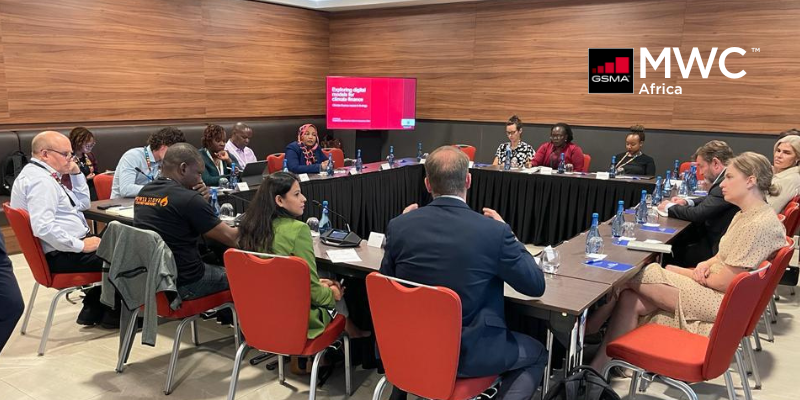On Wednesday, 26 October 2022, the GSMA ClimateTech programme hosted a closed-door roundtable in Kigali, Rwanda, during the GSMA Mobile World Congress (MWC) Africa to explore the topic of climate finance in Africa.
© Image: GSMA MWC Africa 2022 – Roundtable
The roundtable brought together key decision makers from private sector bodies, development partners, implementing partners, and start-ups to discuss the opportunities of integrating mobile and digital technologies in delivering and accessing financing for climate adaptation and mitigation.
The discussion was guided by findings from an ongoing GSMA study, which aims to provide a global overview of the role of mobile and digital technology in low- and middle-income countries (LMICs) in accelerating climate investment and financing. This blog reflects on key themes explored in this session.
Preview of digital climate finance for Africa
Despite financial commitments from different donors and implementers struggle to ensure financing reaches underserved communities – or that the financial flows are engraved in transparent and traceable systems in Africa. This is partly because financing needs to be more fit for purpose and explicit for adaptation. This significantly affects local ownership of climate adaptive solutions, which is essential for climate impact.
Private sector participants in the roundtable including Mobile Network Operators (MNOs), reiterated the continuous impact of climate change on their target market, which directly influences their business and operations. This is despite efforts to meet their science-based targets and, in some cases, further setting strategies to offset their carbon emissions. For this reason, the private sector recognises the need to work in a broader ecosystem (government, donors, implementing partners, financial institutions, MNOs, and start-ups) to explore alternative sources of financing, such as carbon financing.
“There is a vast potential for MNOs to explore alternative and innovative financing for climate change because they have the technology and the data.”
– Mobile Operator
As the carbon financing debate progresses, there is a surge of interest in start-ups to participate in carbon markets as an incentive for businesses to improve their carbon efficiency. It is seen as a transfer of wealth to the most underserved communities – an essential piece in the carbon value chain. Discussions in the roundtable highlighted that start-ups face challenges and frustrations in participating in the Voluntary Carbon Market (VCM). Accreditation is the primary concern as it is time-consuming and costly to a start-up. The return on investment is also delayed due to the need for more automation of existing business models, which influences the quality of data from the initiatives.
The challenge of voluntary carbon markets for African start-ups
Carbon credits (often referred to as “offsets”) have an important dual role to play in the fight against climate change:
- They enable companies to support decarbonisation beyond their own carbon footprint, thus accelerating the broader transition to a lower-carbon future.
- They also help finance projects for the removal of carbon dioxide from the atmosphere—delivering negative emissions, which will be needed to neutralize residual emissions that persist even under the most optimistic scenarios for decarbonisation.
However, while the voluntary carbon credit market is currently experiencing significant momentum, it is still relatively small. Innovative platforms are emerging that seek to provide localised solutions to climate start-ups that would wish to participate in the VCM.
These platforms provide pre-financing and technical assistance to navigate this unstructured market, and standardised methodologies that place gender issues at the forefront. To curb the length of pay-outs, the innovative platforms are considering venturing into future markets that will allow underserved communities to sell their carbon credits before the designated maturity period. This will also serve as a buffer for vulnerable communities to manage emerging shocks in the market.
Gendering climate finance for Africa
Women are the hardest hit by climate change and face adverse challenges in gaining economic equality, partly because of existing social and cultural norms in Africa. Roundtable participants emphasised that it is crucial for all actors in the nexus to facilitate inclusive climate financing, especially from a gender perspective.
As the discussions on climate adaptation progress in Africa, the potential of mobile and digital technologies in ensuring that women access climate adaptation financing is increasingly evident. However, successful application is highly dependent on how women are financially included.
Mobile money has often been a critical platform for delivering climate financing in humanitarian contexts. The female population has built their credit rating through mobile money, which acts as collateral that can be borrowed against. In addition, according to The State of the Mobile Internet Connectivity Report, the usage gap brought about by the lack of literacy and digital skills, affordability (particularly for handsets), access to relevant content and services, and safety and security concerns remains critical. If not addressed, it will continue to serve as a barrier to access and delivery of climate finance in Africa.
GSMA’s climate finance journey
Following deliberations at COP27, we hope to see further interest in the role of mobile and digital technology in financing access and delivery of climate finance. In addition, more conversations need to be advanced on frameworks from carbon financing in low- and middle-income countries (LMICs). This will not only create great entry points for investment and standardised methodologies in the sectors, but will also open innovative financing options and mechanisms that would reach the most underserved.
Stay tuned for our upcoming ClimateTech research report on the topic of climate finance in the coming months – subscribe to our newsletter here to be notified.
THIS INITIATIVE IS CURRENTLY FUNDED BY THE UK FOREIGN, COMMONWEALTH & DEVELOPMENT OFFICE (FCDO), AND SUPPORTED BY THE GSMA AND ITS MEMBERS.



